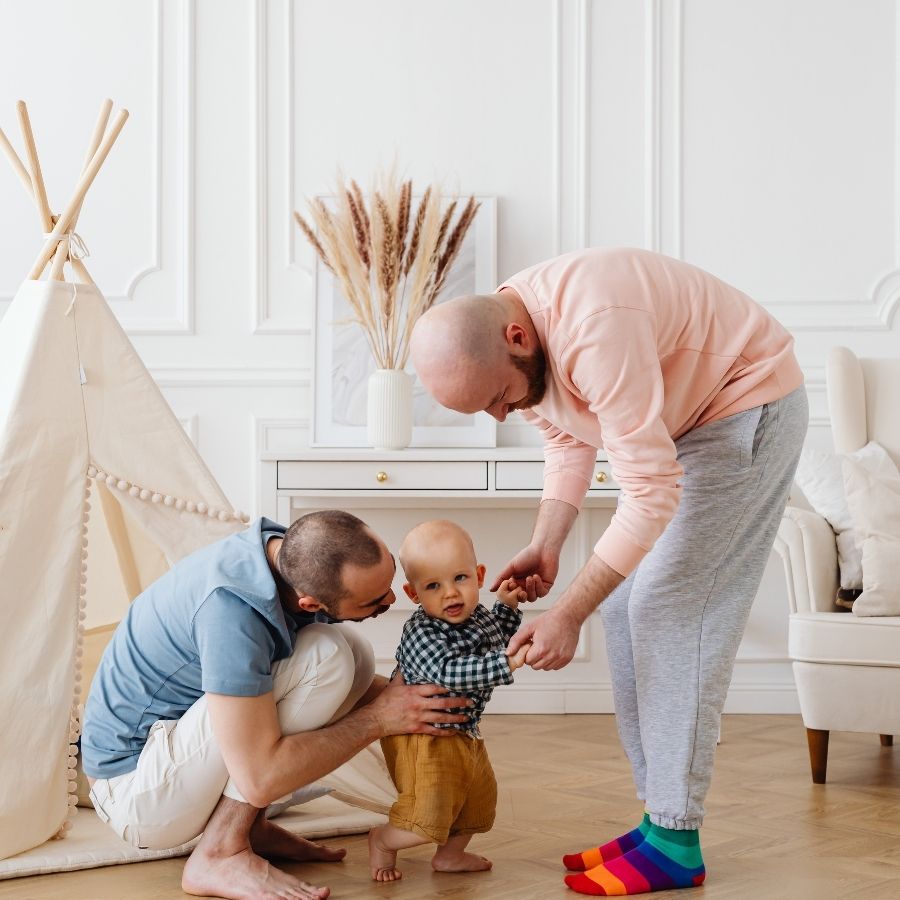The experience of parenthood for LGBTQIA+ couples and single people is no different from anyone else who dreams of a family. However, the journey to becoming a parent can be. We are dedicated to building families together. Thanks to equal parts science and love, regardless of gender, expression, sexual orientation, or gender identity, we are here to help you with a personalized plan towards the experience of becoming a parent.
You have choices and we’ll help you find the one that is best for you! There are many options that make becoming a parent possible, particularly for the LGBTQIA+ community. The two most commonly explored channels are the use of donor eggs or sperm, and surrogacy. Below, we’ll walk you through information about several pathways to parenthood for LGBTQIA+ families.

While we are focused on surrogacy, you and your partner have many options and we have a wide network to help you with choosing the best path for you.
For gay men, it begins with a basic workup. Should you or your partner (or both) like to be the child’s genetic parent, a Reproductive Endocrinologist (also referred to as an REI) will order an infectious disease test (HIV, Hepatitis B, Hepatitis C, etc.) and request a semen analysis. Your doctor will be focused on three main components: Sperm Count, Morphology, and Motility. Again, this is to ensure your reproductive health is in order.
Donor Eggs: Once a sperm source is determined, you will need donor eggs for the In vitro fertilization (IVF) process. Donor eggs can be donated from a friend or relative, but there are also frozen donor egg banks (similar to sperm banks), or you can look into donor egg programs to be matched with an egg donor. Overall, the process would be similar to IVF. You or your partner’s sperm and donor’s eggs would be combined, and any resulting embryos would be transferred to a gestational carrier’s uterus to carry the pregnancy. We also encourage you to visit the Fairfax Egg Bank.
Surrogacy: With gestational surrogacy, the surrogate agrees to carry the embryo(s) created in our lab, using donor eggs and sperm either from you or your partner or a donor. The surrogate is not genetically tied to the baby, and donor eggs are used.
If you or your partner have a fertility issue, such as a poor semen analysis that shows low motility, a low count, or poor morphology, please know there are options, including donor sperm.
Also, if you are interested in transitioning, a Reproductive Endocrinologist can discuss fertility preservation and how to preserve your sperm.
There are many ways to become a mom through Fairfax.
While we are focused on surrogacy, you and your partner have many options and we have a wide network to help you with choosing the best option for you. Depending on how you would like to build your family, we recommend a fertility assessment/workup of the partner or partners intending to be involved in family building or pursuing any reproductive health matters.
This would include blood tests to examine your hormones, such as your FSH (follicle-stimulating hormone) and AMH (anti-mullerian hormone). These two hormones, among others, can provide an overview of your ovulation regularity, egg supply, and egg quality. An ultrasound will also be performed to ensure you do not have any cysts, polyps, or detectable issues.
If you are looking to start a family, here are the two most common options for lesbian female couples:
Intrauterine Insemination (IUI) with Donor Sperm: Commonly known as “Artificial Insemination,” this is when one partner is inseminated using sperm (either from a partner or from a donor) that has been washed and concentrated down to maximize the chances of conception. The sperm is directly inserted through a thin catheter in a woman’s uterus in the hopes that the sperm will fertilize an egg.
Reciprocal In Vitro Fertilization (IVF): Some couples prefer Reciprocal IVF because both partners participate. One partner provides the egg’s genetic makeup, and the partner carries the pregnancy and delivers the baby. In summary, the eggs are retrieved from one partner and fertilized with donor sperm, and any resulting embryos are transferred to the second partner for an intended pregnancy.
If there are any fertility concerns, such as Polycystic ovary syndrome (PCOS), Endometriosis, which is when the tissue that lines the uterus (the endometrium) grows outside of the uterus blocking the tubes, Pelvic Inflammatory Disease (PID), or Recurrent Pregnancy Loss (RPL), please know there are options.
Also, if you are interested in transitioning, a Reproductive Endocrinologist can discuss fertility preservation and how to preserve your eggs.


Not all agencies are the same, and it’s essential you know what your needs and wants are when trying to find one.
At Fairfax surrogacy, we are beyond equal care, and understand finding an agency is a decision that is deeply personal and one that has to feel “right.”
Below are some factors to consider:
Screening Process
Agencies must perform medical and psychological screening on surrogates before introducing them to an intended parent. Ensure the agency has met the surrogate in person; otherwise, you are at risk of being matched with someone who is not ideal. Ask your agency to perform financial and criminal checks on potential candidates. Also, find out what percentage of applicants are accepted to know how selective the agency is.
Legal Issues
Ask the agency if it is involved in any lawsuits or has ever had clients and surrogates engaged in any legal disputes. This information can help you evaluate the agency’s professionalism and ability to navigate the matching process.
Costs and Fees
Ask for a detailed estimate of all of the expenses associated with the process, and compare them to other agencies. Also, reach the level of service you will get within each price range. For example, admissions, case management, and trust administration services may or may not be included. Slightly higher prices may be necessary for an educated and well-trained staff.
Insurance
Most standard health insurance plans exclude coverage for surrogacy. However, if you believe that your policy will cover surrogacy, request in writing from the insurance company that they include your surrogate by name.
In addition to standard insurance, specialty insurance agencies provide insurance coverage for assisted reproduction, including surrogacy, egg donation, and egg cryopreservation. This may add some costs to your process, but it will ensure coverage and peace of mind. Insurance is a necessary cost that can be one factor in your carrier’s healthy pregnancy and delivery.
Some agencies work directly with insurance carriers; others can help you identify insurance agencies that provide coverage for surrogacy.
At Fairfax, our team will hold your hand and walk side by side with you throughout the entire process. We also will tailor our services to match your individual needs as well as offer all-inclusive pricing which is a service that is unique to us.
Be aware that there isn’t any federal law governing surrogacy. That means it’s up to each state to decide how to handle surrogacy, and almost all have them have a unique approach.
In general, forty-seven US states recognize gestational surrogacy. However, three US states do not recognize gestational surrogacy, and contracts are “illegal.” Those three states are Nebraska, Michigan, and Louisiana.
Surrogacy has no boundaries. If you’re an intended parent, you can become a parent no matter where you live. So the laws in the state where your surrogate lives – and will give birth – are the surrogacy laws that matter.
In addition, LGBTIA+ couples may have to go through an additional process to be legally recognized as the parents of their child and to obtain a birth certificate naming both parents. Depending on your state and your circumstances, you may need a pre-birth order, a full adoption, stepparent adoption, or second-parent adoption to ensure both partners are legal parents of the child.


The first step in the process is simply meeting with our team. We value this time together as we learn more about you. We will start evaluating your egg or sperm donation options and the planning process for creating your embryos. At this stage, planning is the keyword. Creating your embryos can be done in parallel with future steps. We are here to connect you and guide you with it.

During this next step in your journey, you will choose and meet with your potential surrogate. The surrogate will then complete her medical screening at your clinic, where she will have a uterine ultrasound. Your doctor will receive a copy of her lab work that we have already completed during the pre-screening process for review for medical clearance.

At this point, things are starting to move along. Your attorney will receive matching information and then draft your “Gestational Agreement.” You and your attorney will discuss your rights and responsibilities and make any changes necessary. After all of the parties have agreed to the terms, legal clearance will be issued.

Now things are getting ready to roll! The clinic will issue you and your surrogate a cycle calendar filled with dates for medication information and monitoring appointments. During this stage, the big day finally arrives, transfer day! This is when your embryo will be transferred to your surrogate at your clinic. If you are local, you have the exciting opportunity to participate in this pivotal day.

Once a pregnancy is confirmed, your surrogate will be released to her medical provider. You will both work very closely with your Fairfax Surrogacy Case Manager to ensure all steps are being met. Your case manager will provide communication and support throughout the pregnancy.

This is the day that we’ve ALL been waiting for. The day your dream becomes a reality. This is the day/step that puts your baby in your arms!
Lorem ipsum dolor sit amet, consectetur adipiscing elit. Ut elit tellus, luctus nec ullamcorper mattis, pulvinar dapibus leo.